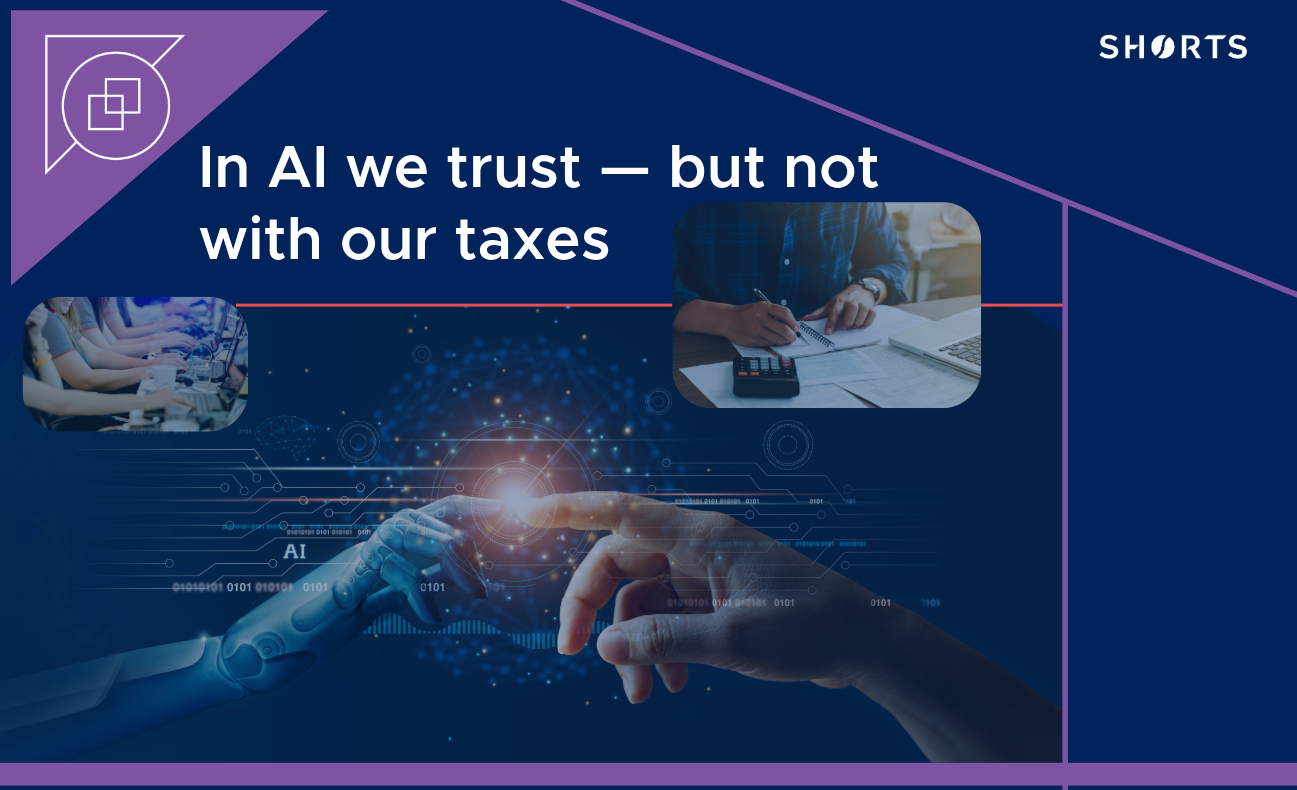
Artificial Intelligence is reshaping industries at lightning speed, and accountancy is no exception.
With the rise of AI accountancy software and tools promising automation and efficiency, many business owners are asking: Can AI replace my accountant?
While AI offers impressive capabilities, including data entry to predictive analytics, it lacks the nuanced judgment, strategic insight, and personalised advice that an experienced accountant provides.
Shorts’ Genus team highlights how AI is being used in accountancy, where it falls short, and why the human touch still matters to your business finances.
What AI can do (and what it can’t) for finances
Undoubtedly, AI has made the greatest strides in streamlining repetitive tasks in accounting. In terms of time and cost efficiency, AI accountancy software can be a game-changer for business owners and independent professionals.
Where AI shines
- Automating repetitive tasks: From invoice processing to bank reconciliations, AI can handle routine admin with speed and accuracy.
- Analysing large datasets: AI can sift through vast amounts of financial data in seconds, identifying patterns and generating reports.
- Flagging anomalies and trends: Machine learning algorithms can detect unusual transactions or emerging trends that might otherwise go unnoticed.
Despite these strengths, AI still falls short in areas that require human judgment and strategic thinking.
Where AI falls short
- Contextual decision-making: AI lacks the ability to deploy holistic oversight, such as the implications of a business decision within a specific industry or market.
- Navigating complex tax legislation: Tax rules are nuanced and ever-changing. AI may not have access to the latest legislation, may struggle to interpret grey areas, or apply legislation correctly to unique scenarios.
- Offering strategic business advice: Accountants don’t just crunch numbers—they help shape business strategy, forecast growth, and advise on financial planning.
- Understanding human nuance and ethics: AI can’t grasp the subtleties of client relationships, ethical considerations, or the emotional weight behind financial decisions.
While you can trust AI to remove the grind of monotonous tasks, high-stakes financial decisions need nuanced judgment and expert insights. That’s where the value of a qualified accountant truly shines.
Why accountants matter more than ever in the advent of AI
As AI continues to evolve, it’s tempting to think that software alone can manage your business finances. But while AI is a powerful tool, it’s not a replacement for the strategic, ethical, and personalised expertise that accountants bring to the table.
Strategic insight
Accountants don’t just report numbers: they interpret them. Using a combination of business context, industry trends, and long-term goals, accountants can help you make informed decisions that AI simply can’t anticipate.
Compliance expertise
Tax legislation is complex and constantly changing. Accountants stay up-to-date with the latest regulations, ensuring your business remains compliant and avoids costly penalties. AI cannot do this to a reliable standard.
Personalised advice
No two businesses are the same. Accountants tailor their advice to your specific needs, goals, and challenges. AI may offer generic suggestions, but it can’t understand the nuances of your business model or growth strategy.
Ethical oversight
Financial integrity matters. Accountants provide a layer of ethical accountability, ensuring transparency and trust in your financial reporting, which is especially important when dealing with stakeholders or regulators.
Navigating economic uncertainty
In times of economic volatility, accountants are invaluable. They help you manage rising costs, adapt to regulatory changes, and guide you through digital transitions with confidence and clarity.
AI vs accountant capabilities
|
Tasks |
AI |
Accountancy |
|
Data entry |
✅ | ✅ |
|
Tax strategy |
❌ | ✅ |
|
Compliance updates |
❌ | ✅ |
|
Emotional intelligence |
❌ | ✅ |
|
Speed & scale |
✅ | ✅ |
Why AI needs accountants
While the conversation may centre around whether AI can replace accountants, the reality is more collaborative than competitive. In fact, AI is becoming an essential tool that empowers accountants to deliver greater value to their clients:
Streamlining workflows
Accountants use AI to automate time-consuming tasks, including data entry, invoice processing, and bank reconciliations. This frees up their time to focus on higher-level work that requires human judgment and expertise.
More time for advisory services
With AI handling the grunt work, accountants can spend more time offering strategic advice, financial planning, and business forecasting. These services are critical for growth and resilience, especially for owner-managed businesses.
Helping clients adopt AI tools
Accountants are also guiding clients through the adoption of AI-powered software, helping them choose the right tools, integrate them into their workflows, and interpret the data these systems produce.
Efficiency meets expertise
This synergy between AI and accountants means businesses get the best of both worlds: the speed and efficiency of automation, paired with the insight and personalisation of human expertise. Rather than replacing accountants, AI is enhancing their role.
Tasks you should really, really leave to accountants
While AI can handle many routine accounting tasks, there are certain responsibilities that are best left to experienced professionals. These are the moments when the stakes are high and the rules are complex, making human judgment critical.
Year-round tax planning
Waiting until the last minute to sort your taxes can lead to missed deductions and unnecessary stress. Accountants help you plan throughout the year, ensuring you’re always prepared and fully utilising available reliefs and allowances.
Cash flow forecasting
AI can crunch numbers, but it can’t anticipate the real-world challenges your business faces. Accountants use their understanding of your operations, market conditions, and goals to create realistic forecasts that help you plan for growth and avoid surprises.
Navigating MTD and digital compliance
Making Tax Digital (MTD) and other regulatory changes can be a minefield to navigate. Accountants stay ahead of HMRC updates and ensure your systems and processes remain compliant — AI tools alone can’t guarantee this for your business.
Business restructuring and investment decisions
Whether you’re considering a merger, acquisition, or internal restructure, these are complex decisions with long-term implications. Accountants bring strategic foresight, risk analysis, and financial modelling far beyond AI’s capabilities to the table.
Don’t choose between AI and accountants — choose both
The future of accountancy isn’t about choosing between AI and human expertise; it’s about combining the two. AI enhances efficiency, but it’s the accountant who brings context, strategy, and trust.
At Shorts, we use AI-powered tools to streamline processes and deliver faster, more accurate insights. We never lose sight of what matters most: helping you make confident, informed decisions for your business.
Whether you’re navigating tax planning, digital compliance, or strategic growth, our Genus and Owner-Managed Business teams are here to support you with the best of both technology and human expertise.
Ready to future-proof your finances?

Alicia Williams
I am the Director of the Genus team at Shorts, a chartered certified accountant and Xero specialist. I specialise in cloud-based accounting solutions, particularly Xero and add-on software, helping clients streamline processes and improve efficiency. As a Client FD, I work closely with businesses to give them a clear understanding of their current position and support their long-term planning and growth.
View my articles